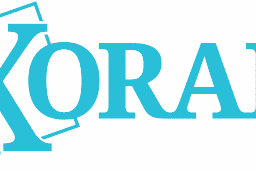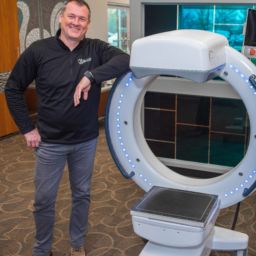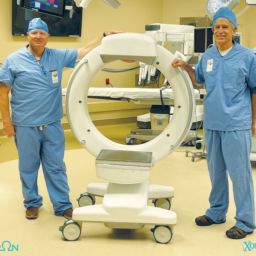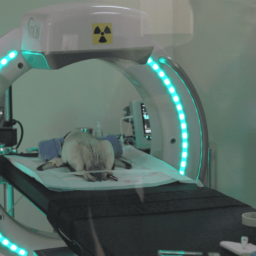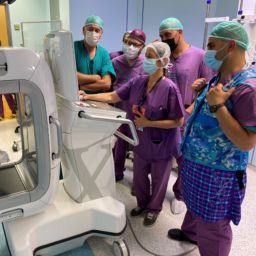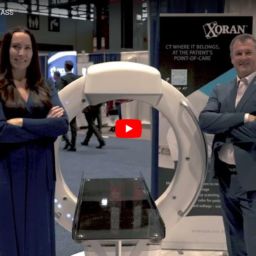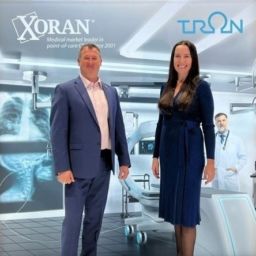Xoran Starts Work on Phase 2 of Mobile Lung CT NIH Grant
ANN ARBOR, MI, June 20, 2022–Today, Xoran Technologies® announces they have begun work on Phase 2 of their mobile lung grant with the goal to confirm the safety and utility of a future thoracic point-of-care CT system in support of an FDA 510k submission.
“It’s hard to overstate how transformative this technology would be for us in the ICU,” says Robert Dickson, MD, Associate Professor—Pulmonary & Critical Care Medicine, Associate Professor—Microbiology & Immunology, and a clinical collaborator, all at the University of Michigan. “Every day, we make clinical decisions based on chest X-rays, which are limited in what they can tell us about what is going on in the chest or abdomen. Our patients are often too sick to transport down to radiology, or they have a communicable disease like COVID-19 that we don’t want to spread around the hospital. A bedside scanner would have immediate impact in how we manage our sickest patients.”
In 2021, Xoran Technologies was notified of a grant award from the National Heart, Lung, and Blood Institute (NHLBI) through the National Institutes of Health (NIH) to support the company’s research and development efforts for lung cone beam computed tomography (CT) imaging. Earlier this year, Xoran announced they completed Phase 1 of this grant. Just last month, Xoran submitted its 510k for TRON™, an open-bore fluoroscopy CT for full-body point-of-care imaging.
“We greatly appreciate the support from NHLBI as well as a fantastic collaboration with doctors at the University of Michigan,” states William van Kampen, Xoran’s Chief Technology Officer and principal investigator on the project. “This grant enables us to obtain valuable clinical feedback and accelerate our commercialization of this exciting technology and help bring imaging to patients who are in great need.”

This project allows Xoran to optimize a point-of-care solution specifically for lung imaging. The combined Xoran and UofM teams aim to develop a highly deployable CT scanner intended for use in ICU, especially for patients with acute respiratory failure requiring mechanical ventilation.
NIH: Research reported in this news release was supported by the NHLBI of NIH under Award Number 4R44HL158452-02. The content is solely the responsibility of the authors and does not necessarily represent the official views of the National Institutes of Health.
About the National Institutes of Health
Research reported in this news release was supported by the NHLBI of NIH under Award Number 1R44HL158452-01. The content is solely the responsibility of the authors and does not necessarily represent the official views of the National Institutes of Health.
About National Heart, Lung and Blood Institute (NHLBI)
NHLBI is the global leader in conducting and supporting research in heart, lung, and blood diseases and sleep disorders that advances scientific knowledge, improves public health, and saves lives.
About Weil Institute for Critical Care Research & Innovation
The team at the Weil Institute for Critical Care Research & Innovation is dedicated to pushing the leading edge of research to develop new technologies and novel therapies for the most critically ill and injured patients. Through a unique formula of innovation, integration, and entrepreneurship, their multi-disciplinary teams of health providers, basic scientists, engineers, and data scientists, commercialization coaches, donors and industry partners are taking a boundless approach on re-imagining every aspect of critical care medicine. For more information, visit Weil Institute.
About the University of Michigan
The University of Michigan was founded in 1817 and is a state-supported institution with a national and international reputation for excellence in scholarship. The Ann Arbor campus enrolls more than 43,000 students annually, including over 15,000 graduate students. The Michigan Center for Integrative Research in Critical Care is a collaborative center within the University of Michigan dedicated to improving the care of patients with critical illness by uniting the diverse expertise of faculty from across the institution.
About Xoran Technologies
Since 2001, Xoran is the pioneer and medical market leader in low-dose radiation, cone beam CT systems specifically designed for the patient’s point-of-care. Providers around the world rely on our industry leading MiniCAT™, xCAT™, and veterinary CT systems: VetCAT and vTRON, to diagnose and treat patients.
Xoran is based in Ann Arbor, Michigan.
For more information visit www.xorantech.com/
© 2022 Xoran Technologies, LLC
Media Contact
Aramide Boatswain
+1.734-709-0464
info@xorantech.com



